Jodi Haywood returns for the third November in a row (2014 post | 2015 post) to participate in the #flipthscript movement, in which adopted people take over the microphone in this space for November’s National Adoption Awareness Month.
You may not agree with everything that is said in these #flipthescript posts. You may even find parts of these posts hard to read. But I believe there is value in listening, in being willing to see a viewpoint different from your own, in uncovering your own triggers and fears.
But of Course
There seem to be several topics frequently discussed among adoptees, within private adoptee circles, which when brought up cause the majority of the group to nod our heads in understanding and think, yes, we could put our collective heads together and write a book on this subject.
Yet when we bring up the same topic with adoptive parents, they seem amazed that we connect it with adoption at all. They wonder how such a thing could be an almost universal adoptee experience. But then, possibly, they take a step back and think of the times their adopted children behaved similarly…but it had nothing to do with adoption, did it? The agency never warned them it might happen. Their adoptive-parent friends never mentioned it.
Adoption & Eating Disorders
At a time when eating disorders are prevalent in various forms at every level of society, when the majority of women and an increasing number of men have struggled with weight and body image at some point in life, it’s difficult to offer convincing proof that our adopted status may be at least partly to blame. But consider these things:
1. Some studies show that adoptees are at least 4 times more likely to commit suicide than the general population, and probably more likely than that to make at least one attempt.
Suicidal ideation — thoughts of ending one’s life — can be a day-to-day mindset even for those who never make an obvious attempt. Adoptees are also highly overrepresented in treatment facilities for addictions of all kinds. And eating disorders, at one end of the spectrum or the other, may be counted as addictions or addictive behaviors.
2. Body type, build, and weight distribution are among the physical characteristics we inherit from our parents and ancestors. When we’re adopted into another family, we do not assimilate their DNA into our bodies by osmosis or any other method. We retain our own, while we lose the vital genetic mirror of our blood family. We look around our environs and see people we bear little or no physical resemblance to, who don’t share our body type or metabolism, while we’re deprived of anyone to model what we will look like when we grow up.
And while we wonder where we got our eyes or nose or gifts or talents, what we may be even more concerned with — especially we females during adolescence — is how much we’ll develop and in what ways. Will I have to starve myself just to fit into a size 10 when my non-genetic sister can eat whatever she wants and wear size 1? And why do my parents keep comparing me unfavorably to her?
3. Research indicates that babies breastfed by the mother who carried them are less likely to be, or later become, overweight than babies given formula or weaned early. The implications of this for someone adopted as a newborn or early in infancy are obvious.
4. To children adopted past infancy, especially from other countries or cultures, the new adoptive family is almost certain to have different foods, different mealtime habits, and perhaps different attitudes toward food than they are accustomed to. He may not be “just a finicky toddler” and she may not “just get used to it.” They may have learned to be suspicious of food offered by strangers (and the adoptive family are strangers in the beginning) or they may resist another’s attempt to feed and nurture them. Also, food hoarding is very common among children who experienced early deprivation. Like other eating disorders, this is not a stand-alone issue but an outward sign of the complex trauma of adoption, and should be addressed as such rather than punished.
5. In simple terms, food represents nurture. From our very first feeding, one of our most basic needs is being met. This is a complex emotional issue beyond the scope of this article, but suffice it to say that adoption involves the loss of the one who, under most circumstances, is best equipped to meet our basic needs — the natural mother.
Adoptees of all ages may resist or reject the adoptive mother’s attempts to meet their needs, and we develop self-soothing, self-nurturing behaviors; essentially we attempt to mother ourselves. Any self-soothing behavior can turn self-destructive when taken to the extreme. Whether we turn to food as comfort or deprive ourselves of it by force of will, whether we try to fill ourselves with as much as we can hold or purge it from our bodies by any means possible, I believe that every one of these behaviors is a reaction to the loss of our natural mother.
My Early Traumas
 I know the journey. For the first six months of my life, I had my mother, who was told that my response to early family upheaval was simply hunger and to “keep feeding me.” For the year after that, my grandparents raised me; I have very little information about that time in my life.
I know the journey. For the first six months of my life, I had my mother, who was told that my response to early family upheaval was simply hunger and to “keep feeding me.” For the year after that, my grandparents raised me; I have very little information about that time in my life.
After my grandfather’s sudden death — while he was holding me — I was taken to another country to live with an aunt and uncle I’d never met. I was not quite 2 years old, and almost 4 when they finalized their adoption of me.
While my aunt didn’t exactly starve me, she did carefully monitor my food intake, and allowed no “junk” in the house. She also kept me active with long walks, perhaps longer than I had the stamina for at that age. My aunt and uncle were both quick to criticize heavier people, and of course I internalized their attitudes: the worst thing anyone could be was overweight.
By age 10 or 11, I figured out that running and bike riding were good ways to get out of the house and avoid my aunt and uncle, and they’d never complain as long as I was being active. At 12 I ran my first 10K road race.
I also reunited with my father at that age, which was the best and worst thing to happen to me up to that time. The best, because Dad and I bonded right away, or we restored the bond we’d had before my aunt took me away from him. The worst because my aunt and uncle resented that bond, and because when the visit was over and they took me away from him one more time, it brought back feelings much too deep and complicated for 12-year-old me to deal with.
No counseling was offered; my aunt and uncle didn’t see it as the life-altering event it was, just a visit with a “distant relative” I hadn’t seen since before I could remember.
93 Pound Blimp
At the start of 8th grade when I was 13, I almost completely quit eating. Maybe it was a refusal of my aunt’s cold, superficial nurturing. Maybe it was a response to my aunt and uncle’s fat-shaming comments and to my changing body. I weighed 93 pounds fully clothed, but I felt like a blimp, and I beat myself up for every bite that went into my mouth.
Every Saturday I would hit the local running track and run 20 miles, then go for a long bike ride. Every Sunday I would run another 10 and go for another long ride. I would run in the mornings before school and go biking after school, all of this on very little food. My aunt threatened to take me to the hospital, either as an inpatient or to show me all of the kids who were supposedly worse off than I.
I would have welcomed hospitalization to get away from her, except I knew I wouldn’t be able to keep up my rigorous training schedule. I ran my first marathon when I was 13. Overtrained and undernourished, I didn’t do very well, but I pushed myself to the finish line. I weighed about 90 pounds and was very discouraged because the weight wasn’t coming off. My body was actually in starvation mode from all of the running and constant exercise and held on to everything it could, but I didn’t know this at the time.
When I was 15, I was part of an outdoor education program at school, and our class used to run at least once a week. I remember one boy calling me Thunder Thighs. I had run two marathons and numerous other road races by that time, and when our class did a 10K endurance run, I completed it in 47 minutes, first girl to finish and beating all but 2 or 3 of the boys. (Including the one who called me Thunder Thighs).
But I didn’t think to tell him they were “killer quads” or that I run like a girl — try to keep up. No. On my bike ride home from school (5 miles, uphill both ways, for real) I stopped at the drug store and bought my first diet pills.
Finding the Line Between Punishing & Pushing
I would like to say I’m all better now, but not much has changed. I’m still running marathons, and I try to train smarter and eat better, but I still push myself to the point of injury and have to force myself to eat. I still deal with stress and rejection by not eating. I still feel guilty for carb-loading the night before a race, even when it pays off with a Boston qualifying time and an age group placement. I still fight the addiction to diet pills and various forms of purging. Exercise bulimia, the experts call it.
My aunt and uncle adopter are both dead now, but while my uncle was alive I watched his interactions with my daughter and saw all too clearly how he and my aunt contributed to a lifetime of eating disorders for me. I’m glad my daughter is stronger than I was, and has more self-esteem than I’ve ever had. I let people abuse me because I didn’t think I deserved better. I know there is a very fine line between punishing myself and pushing myself as a runner.
What the Self-Punishment Was For
I realized, not very long ago — following a visit with a dear friend who has known me since I was an anorexic 13 year-old and refuses to accommodate my eating disorders — that all this time I’ve been punishing myself for being born. I’ve been trying to destroy myself because I believe my mother should have destroyed me before I was born. I feel as if I don’t have the right to exist, I don’t deserve to be fed or nurtured or loved or to take up space on this planet. I have to constantly prove my own worth as a human being; I remember my uncle telling me that in almost those exact words.
I have to justify my existence somehow. I should not feel this way; it goes against everything I believe in, that life matters, that size doesn’t matter, that nobody’s value is defined by the numbers on the scale or the size of their clothes. But because I was adopted, because I was raised by people who did not and could not accept me for who I was and who I came from, who hid my truth from me and kept me from the parents I did resemble, I feel as if I don’t fit in anywhere. If I become thin enough, they won’t see me and won’t notice that I don’t belong.
Nobody deserves to feel this way. Even if nobody notices you don’t belong, it doesn’t change the way you feel about not belonging.
Takeaway for Adoptive Parents
Adoption, in theory, is supposed to give you a place to belong when your parents can’t or won’t provide that for you. Maybe if the adopters are a good fit for the adoptee and have no expectations of a child not born to them, just unconditional acceptance, the sense of belonging will happen over time.
But for too many of us, unconditional acceptance is not part of our experience, either received from others or from ourselves. Accepting yourself when your original family, adoptive family, or other caregivers rejected you might be the hardest thing you’ll ever do. It’s also the only thing you can do to keep from destroying yourself.
~~~~~
Jodi Haywood was adopted internationally by relatives at the age of 3. She is a wife, mom, stepmom, multi-published author, and a Boston-qualifying marathon runner. She has contributed to the anthologies Adoption Therapy, Adoptee Survival Guide, Flip the Script, and an upcoming book on adoption reunion. She is currently finishing her BA in psychology and working on a book dealing with eating disorders from adoptee perspectives (submissions welcome!)
~~~~~
Other Posts in the #flipthescript Series:
- 1: Why Are Adoptees Doing It?
- 2: Whose Script? Whose Voice?
- 3: Who is Best Placed to Talk About the Adoption Experience?
- 4: Someone Profited From My Adoption But It Wasn’t Me
- 5: Adopters: Want Trust? Give Truth.
- 6: Adoptee Rights Begin at Birth
- 7: Hold On
- 8: Adoptees Are In Reunion Whether They’re Searching or Not
- 9: The Healing Power of Open Adoption
- 10: I Guessed My Birth Mother’s Name
- 11: Abuse to Adoption to Addiction to Affirmation
- 12: A 1970s Adoption Story
- 13: Adoptee Healing & Hope
- 14: Adoption & Eating Disorders
- 15: In Adoption There Is No Easy Button


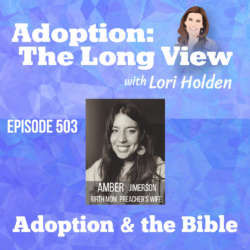
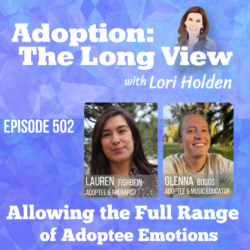
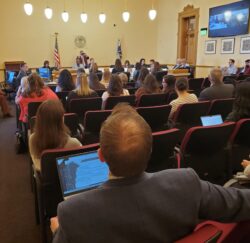
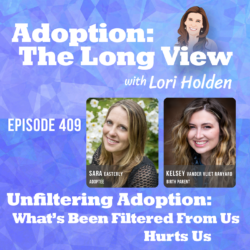

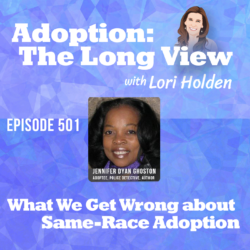
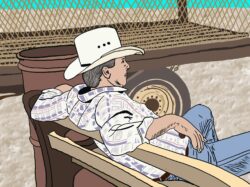
4 Responses
I followed this word for word. I do believe many adoptees are hard wired to want to destroy themselves and it is the battle of their lives because it isn’t truly what their soul wants. Or whatever part survived the adoption to remain singularly strong.
I don’t know how I finally stopped having issues with food. It feels like a miracle. But I still struggle every morning when I wake up to get myself in a positive head space.
It’s all so complicated. It means so much when an adoptee tells the world what she thinks and feels. Thank you.
I also hung onto every word of this. Especially the part where you believed you allowed others to abuse you. All I could think of during that description was what choice did you have? How were you to know any differently?
As hard as it is to hear, I’m grateful you are sharing your insights to being an adoptee. It does make sense that there would be this connection between adoption and eating disorders/exercise compulsion. As much as so many would like to ignore this, painting a rosy picture instead, hearing the statistics means that we can not only begin to understand the complexity that is adoption, but also learn how to help heal that trauma. So thank you.
Thank you. I can sure see myself in your story, and it takes me back to my early teens and twenties. I completely identify with the wish to destroy myself. Your work should be read by anyone thinking of adopting and well, everyone.
Your post sheds light on important issues. I agree that food and nurture are absolutely connected– on a primal level. The more adoptees like yourself are willing to peel back the veil of silence and share your insights and experiences, the more that professionsals and parents can understand who they have to become and what they have to learn in order to compassionately and properly parent the children entrusted to them.